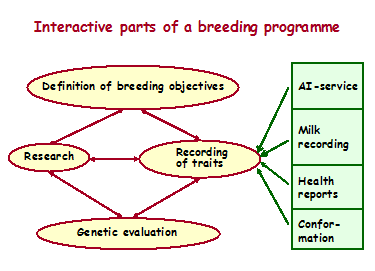The design of any efficient breeding programme relies on research results and practical experiences. The research should include analysis of breed characterization data, estimation of genetic parameters specific to the actual breed and environment [CS 1.8 by Mpofu]; [CS 1.9 by Aboagye]; [CS 1.16 by Mpofu], development of appropriate methods for estimation of breeding values and for selection, analysis of results from different reproduction technologies etc. Evaluation of exotic germplasm and its utilization is another important area [CS 1.4 by Mpofu]; [CS 1.5 by Kahi]; [CS 1.8 by Mpofu]. The advent of molecular genetics and MAS provide new opportunities and bring research and practical breeding programmes closer. Experiences from many countries show the value of data from livestock recording schemes for research (Figure 6). Using such data is advantageous as they are relatively cheap and offer opportunities to estimate relevant genetic parameters for the breeding programme and to monitor its progress. Furthermore, they familiarize more people at scientific and extension level with livestock data and results that reflect real life situations. Livestock recording schemes, therefore, provide effective mechanisms for implementation of research results in practice (Philipsson et al., 2005).

Figure 6. The interactive parts of a dairy breeding programme.
Technical (research and academic) institutions design and sometimes perform/conduct genetic evaluations. However, these institutions do not provide adequate and timely feedback on the evaluations to farmers; this is one reason for the failure of breeding programmes in developing countries. Lack of feedback should no longer occur given the great advances and reduction of costs in telecommunication and communication through the Internet. Moreover, access to cell phones and Internet connectivity are expanding rapidly in many areas. Innovative use of these systems in relaying raw data to data centres and results back to the farmers should be explored.
